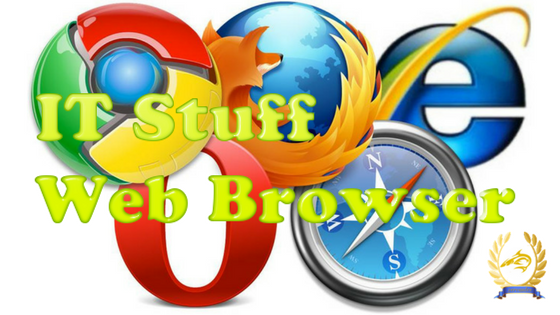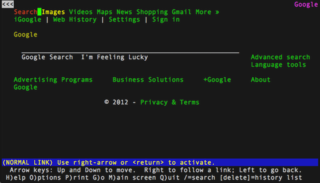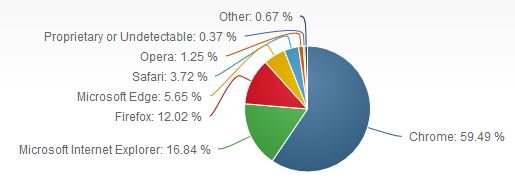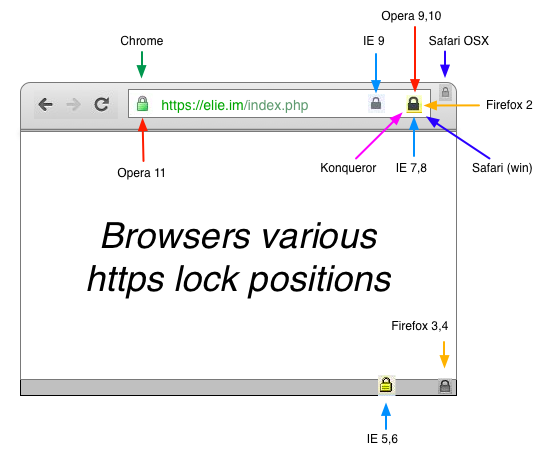One of the most used computer programs is the Web Browser. It is our gateway to the internet. But what do we really know about the Web Browser and more importantly how do we make sure that our Web browsing is secure?

What is the Web Browser?
Some of my non-techie family members still refer to the web browser as "the internet" and think that the blue "E" icon is their only way of connecting to the world wide web.
But in fact the Web browser or browser is a software program that locates, retrieves and displays content on a network, like the World Wide Web (that is why a lot of web pages start with www). The content can be Web pages but also images, videos and other files.
The Web browser is what we call in IT a "client", clients contact and request information from a server.
The server sends the requested information to the client and the client then displays the information for the user.
The different flavors
Way back in the early days of the internet there were not as many web browsers as we have today. The most well known of that time were Netscape Navigator and Microsoft's Internet Explorer. Internet Explorer owes its fame for the most part to the fact that it is bundled in Microsoft Windows (operating system).
Things have changed since then and now we have a lot more browsers to choose from.
- Internet explorer (Microsoft)
The senior among the Web browsers, for a long time this was the standard browser that people used. Internet Explorer or IE is bundled with Microsoft windows.
Microsoft have introduced a new Web browser with Windows 10 called "Edge" this is a totally new browser that can also be used on mobile devices unlike Internet Explorer. The browser kind of looks and feels like Google's Chrome but with less extensions. Truth be told it feels like Edge is still in a Beta mode.

- Chrome (Google)
The browser from the people behind the most used search engine in the world. Like with all their products, Google started small but slowly increased its market share. Chrome is now the most used Web browser in the world. The Browser owns its popularity to the simpel yet effective design and speed.

- Mozilla Firefox (Mozilla)
Mozilla started as a company that made software for Linux distributions. Firefox and Thunderbird (e-mail client) often came standard with the major Linux versions. Since then Firefox has evolved into a flexible and secure Web browser.

- Safari (Apple)
Apple's standard browser for Apple devices. The browser is also available for windows but is not as popular as the other browsers. Safari is lightweight and stable but lacks the plugins that other browsers offer.

- Opera (Opera)
When I first used Opera it could fit on a floppy disk (yeah, it's that old). It was the most lightweight and fastest browser around. Opera is still fast and is best described as a cross between Firefox and Chrome (which isn't a bad thing).

Honourable mentions
Vivaldi
A highly customizable browser that you can custom tailor to suit your needsChromium
The open source version of the Chrome browser. For all those who want the good things that Chrome has to offer without Google's tracking and spy software.Lynx
For the die hards. Lynx is a text Web browser, so no images or videos just plain text.
 /)
/)What is important?
There are a couple of things that you have to take into account when deciding on a Web browser.
Speed
You don't want to wait minutes for a Web page to load or refresh, so you need a fast browser even with slower internet connection. Chrome and Opera are two of the fastest browsers at the moment.Security
Perhaps the most important aspect of a browser (more on security later). We use browsers more and more for a lot of highly sensitive transactions like Banking. A lot of services and programs are now Web based, this means that your browser has become as we call it in IT a SPoF, Single Point of Failure. Just imagine what kind of damage hackers could do if they could access your Web browser!Extensions/Plugins
A browser is just a browser but becomes so much more when you add extensions. Suddenly a lot more is possible. Firefox and Chrome have an extensive library of extensions that you can use to enhance your Web browsing antics.
@yournews had a very valid comment about Security and Extensions/plugins. Keep in mind that (in particular) third-party add-ons to your browser can impact the security of your browser. It is advisable to always check if the plugins/extensions do not interfere with the security of the browser. Also never add extensions/plugins that are not from the browser's repository.

Security
I told you that I would come back to this one. Back in the days Web browser were used only for cruisin' the Net but now we do such much more with browsers. I am actually typing this text in an online editor, all the images in this blog are hosted on a remote server that I access via my Web browser. The first thing I do (probably most people) when I turn on my laptop is fire up the ol' browser because that is where I can access most of my (Web) applications.
Especially with finance like banking or cryptocurrency it is very important to have secure connections. I have read a lot about people who were scammed by fraudulent Web sites.
To battle these types of scams and fraud a new protocol has been introduced: HTTPS.
I am not going to explain the technical details but just tell you that it is very important that you take note of the Web site you are connecting with.
When you look at the address bar in your browser (at the top), you will notice that all the addresses start with: https:// or http://, this is the protocol being used for the connection.
The most important thing to know is that HTTPS is a secure line and HTTP is an unsecure line. Now this doesn't mean that all the http connections are bad, it just means that it is unsecure. Most (if not all) companies especially banks and exchanges have switched from http to https.
You can also check this by looking at the the address bar (depending on your browser), if you see a green lock then you have a secure connection. If you click on this lock you can check the level of security this connection provides.

To summarize
There are a lot of good Web browsers available, try them out to see which one suits your needs the best
Security is the most important factor when using a Web browser, make sure that you always have a HTTPS connection.


How to generate more traffic for your Posts
Want to know the ideal length for a Post?
IT Stuff: Operating System
Things that work against Cryptocurrency
Too Much Marvel?
Steemin'by Xervantes
The current state of the gaming tag

